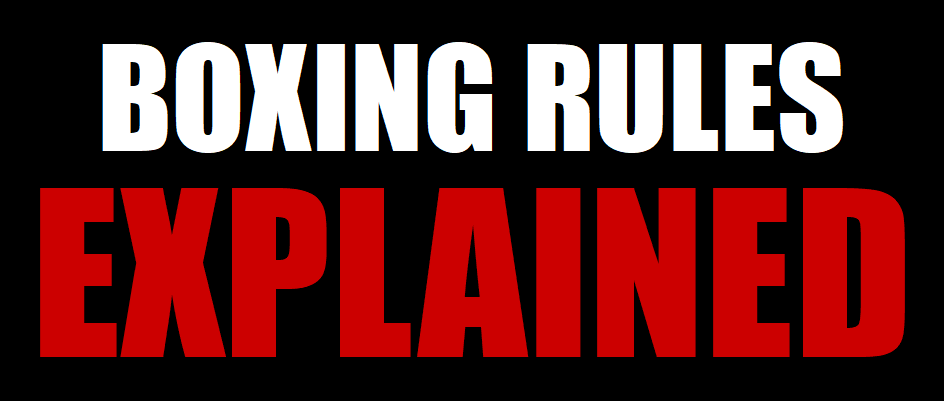A complete boxing words, terms & phrases glossary featuring every piece of lingo – here covering J, K and L. Just part of our huge Boxing FAQ.
Select a glossary section from below:
Words & Terms: J

Jab
Often referred to as a boxer’s most important punch. The jab, generally not considered a power shot, can be used to score points, frustrate an opponent, measure range, and set up combinations such as a one-two. The sign of a great ‘boxer’ is often an accurate, stiff jab.
Orthodox boxers generally snap out the jab and immediately return their glove to their chin to avoid getting caught by counters. Boxers such as Larry Holmes and Muhammad Ali were celebrated for their exceptional jab.
Journeyman
A boxer who stands little chance of capturing a world title due to limited boxing skills and strengths. He may fight a great deal more than mainstream boxers due to low purses, and therefore have a fight-packed record containing just as many losses as wins.
Journeymen are often matched with young prospects to build their confidence, records, and simply make them look good. For this reason, journeymen can be seen as ‘sacrificial lambs’ for future stars.
Judge
A ringside official who has been appointed to score the contest by a state’s boxing commission. A 10-point-must scoring system is used in the professional ranks to determine a boxing result.
Judging Panel
Consists of three judges, who score an Amateur or Professional bout, based on a scoring system set beforehand. Judges are often seated on different sides of the ring, and are forbidden from discussing unfolding scores with their counterparts or other officials to ensure uninfluenced scoring.
You can find out more about judging and decision types in our Boxing Results Explained Guide.
Junior Bantamweight
Or Light Bantamweight, Super Flyweight; boxers must not weigh in excess of 115 lbs/51kg at the bout’s weigh-in.
Junior Featherweight
Also referred to as Light Featherweight, Super Bantamweight; a weight limit of 122 lbs/55kg is imposed.
Junior Flyweight
Also known as Light Flyweight, Super Strawweight; boxers campaigning in this division must not weigh in over the limit of 108 lbs/49kg.
Junior Lightweight
Or Super Featherweight; boxers must not weigh in excess of 130 lbs/59kg in this boxing weight class.
Junior Middleweight
Also referred to as Light Middleweight, Super Welterweight; boxers must not exceed 154 lbs/70kg on the scales prior to their matchup.
Junior Welterweight
Or Light Welterweight, Super Lightweight; a weight limit of 140 lbs/64kg is set at the weigh-in.
Words & Terms: K
Keep It Clean
A term and order often spoken by the referee to remind boxers not to deviate from the rules of boxing. For example, a boxer who throws a rabbit punch may be told to “keep it clean!”
Kidney punch
A body shot delivered to the kidney area; when delivered effectively, boxers more than often can’t rise to beat the count.
Kissed the Canvas
Generally refers to a boxer who has suffered a knockout loss which saw him face down on the canvas, close enough to ‘kiss the canvas’.
Knockdown
When a boxer is knocked to the canvas as the result of a punch or punches either to the head or body. A 10-count is given by the referee to the felled boxer who must rise to his feet to remain in the fight.
Knockdown Timekeeper
A ringside official who initiates a 10-count when a boxer is knocked down. This can aid the referee who may be busy ordering the knockdown-scorer to a neutral corner; the referee can now easily resume his count by listening to the knockdown timekeeper’s.
Due to ‘long counts’, which are often unintentional, the knockdown timekeeper also acts as a safeguard to ensure a boxer receives no more than 10 seconds to regain his feet.
Knockoffs
Or an Upset; a bout where the heavy favorite gets knocked out or defeated by an overlooked underdog.
Knockout (KO)
Not to be confused with a TKO (technical knockout); a knockout occurs when a boxer is unable to regain his feet before the referee has completed a 10-count. For more information on knockout variations, see our Boxing Results Guide.
Knockout Artist
A boxer well-known for winning his bouts via knockout and or scoring a high number consecutively. These boxers carry vaunted power and carry great mainstream appeal to audiences. Mike Tyson is a notable knockout artist, as is Gennady Golovkin, Artur Beterbiev and Gervonta Davis.
KTFO
Not an expression to use in front of your mother; after a boxer suffers a particularly brutal knockout, it may be said that he was “knocked the f*** out!”.
Words & Terms: L
Lacing
When a boxer pushes, rubs or twists the lower laced underside of his glove in the face of his opponent. ‘Lacing’ can open or worsen a cut, and is considered an infringement of boxing rules.
Landslide Decision
A Unanimous Decision that sees a boxer win many if not all of the rounds on the judges’ scorecards.
Lead with One’s Chin
Refers to a boxer who fails to keep his chin tucked in when throwing punches. Leading with one’s chin is often considered a fundamental flaw, and at worst can lead to a knockout loss.
Life and Death (fight)
A bout that sees both boxers taking large amounts of punishment, seemingly willing to go ‘life and death’ to seize victory. John Molina Jr. vs. Lucas Matthysse is worthy of that phrase.
Light Bantamweight
Or Junior Bantamweight, Super Flyweight; a weight division that holds a 115 lb/52kg limit.
Light Featherweight
Or Junior Featherweight, Super Bantamweight; a weight class where boxers must not exceed a maximum weight limit of 122 lbs/55kg.
Light Flyweight
Also know as Junior Flyweight, Super Strawweight; boxers campaigning in this division must not exceed the 108 lb/48kg limit.
Light Middleweight
Or Junior Middleweight, Super Welterweight; boxers in this boxing weight class can weigh a maximum of 154 lbs/70kg.
Lightweight
A boxing weight division which carries a 135 lb/61kg limit.
Light Welterweight
Or Junior Welterweight, Super Lightweight; a weight division which carries a 140 lb/64kg weight limit.
Litmus Test
A potentially difficult fight on paper for a young prospect; a commentator might say that “John Smith finds himself in a real Litmus test tonight.”
Liver Punch
Literally a body shot to the liver section; if landed effectively, this can be a particularly debilitating shot for a boxer to recover from and beat a 10-count.
Loaded Gloves
A boxer with an illegal substance beneath the knuckle padding of his handwraps is said to be wearing ‘loaded gloves’. Since a boxer with loaded gloves can inflict greater damage on his opponent, they are therefore strictly illegal. The consequences of loaded gloves can be potentially catastrophic, leading to severe health disabilities, commas, and even death.
A caught boxer can face a large fine, be suspended from the sport for a year or more, and even face a lifetime ban. Antonio Margarito’s gloves were reportedly ‘loaded’ with a hardening plaster-like substance prior to his bout with Shane Mosley.
Locking Mitts
When a boxer clamps his opponent’s (power hand) forearm in between his elbow and ribs, and attacks his opponent with his free hand. While technically an illegal practice, referees often prefer to ‘break’ the two boxers rather than issue a warning or deduct a point.
Loss on Points
When a boxer loses a contest on the scorecards via Split Decision, Majority Decision or Unanimous Decision.
Low Blow
A fouling punch (intentional or not) in which a boxer is hit below the belt line in the groin, hip or thigh area. The afflicted boxer, if struck in the groin, will often need time to recover. Oleksandr Usyk was the subject of a controversial low blow received against Daniel Dubois in 2023.
You can see a list of boxing fouls in our Boxing Rules Explained Guide.
Long Count
When a referee, usually unintentionally, gives a knocked down boxer a count exceeding 10 seconds. This may be the case for a number of reasons, such as having to deal with an opponent who has not returned to a neutral corner.
‘Long counts’ are rare in modern day boxing as knockdown timekeepers are often present to assist the referee should he suffer from a distraction.
Lucky Punch
When a boxer is hit by an unexpected great punch which may result in a knockdown or knockout. The boxer who threw the punch may be considered a heavy underdog at the time, and his shot therefore considered ‘lucky’.
Select a glossary section from below:
Return to Boxing FAQ?






